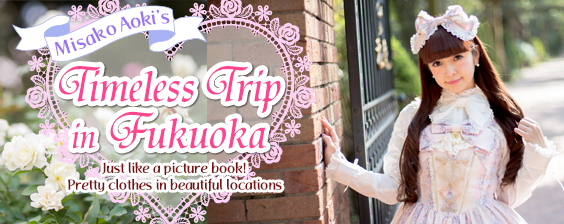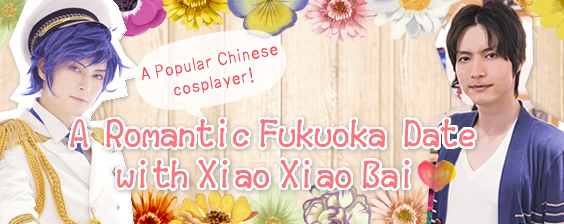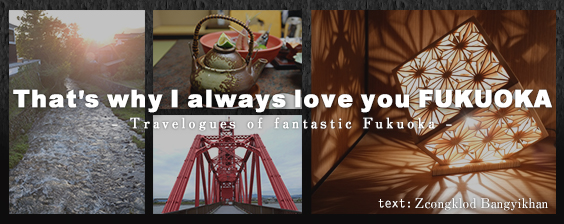- Home
- feature
- Interview Now
- Interview Now - Tochi Ueyama, ...
Interview Now - Tochi Ueyama, Suu Minazuki, Takahiro Seguchi, Haruhiko Mikimoto, Reine Hibiki, Makoto Kaneuji (Manga CPO) -(2/3)
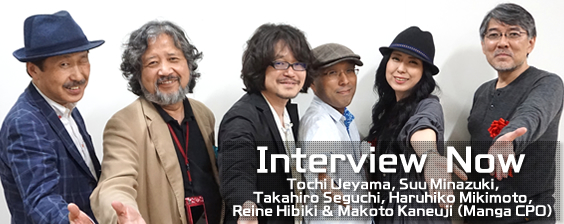
If the readers are that passionate, then aspiring manga artists should also have a strong sense of passion.
ab:Do manga artists active in Fukuoka often get many opportunities to get together?
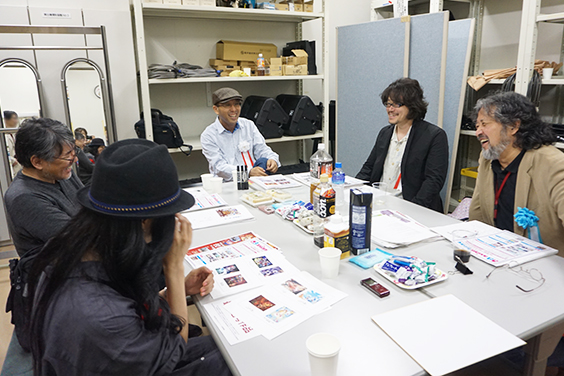

Ueyama: Oh yes.
Minazuki: We like drinking, so it's a good idea to have a lot alcohol ready.
Seguchi: We drink a lot (lol)! For us, it's nice because we can drink for a long time. People in Tokyo usually get home by catching the last train, but in Fukuoka people will often miss it and go back in a taxi.
Kaneuji: And the taxis are cheap! Mr. Ueyama is a bit further out, but for most of us, even if we miss the last train we can jump in a taxi and get home for about 2 to 3,000 yen!
Reine Hibiki (Hibiki): Oh, is that right? I asked a few writer and illustrator friends of mine who are from Fukuoka, "why don't you move to Tokyo?" They told me that the food in Fukuoka is delicious and they can get to Tokyo by plane easily, so there wasn't any need to leave. Now I get it, what they said makes sense.
Minazuki: We like drinking, so it's a good idea to have a lot alcohol ready.
Seguchi: We drink a lot (lol)! For us, it's nice because we can drink for a long time. People in Tokyo usually get home by catching the last train, but in Fukuoka people will often miss it and go back in a taxi.
Kaneuji: And the taxis are cheap! Mr. Ueyama is a bit further out, but for most of us, even if we miss the last train we can jump in a taxi and get home for about 2 to 3,000 yen!
Reine Hibiki (Hibiki): Oh, is that right? I asked a few writer and illustrator friends of mine who are from Fukuoka, "why don't you move to Tokyo?" They told me that the food in Fukuoka is delicious and they can get to Tokyo by plane easily, so there wasn't any need to leave. Now I get it, what they said makes sense.
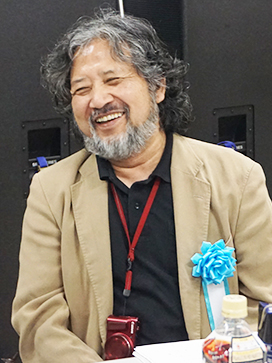
Mikimoto: Like Ms. Hibiki was saying, work friends who are in editing and have spent some time in Fukuoka for business trips or have lived there for a while told me that the food is cheap and delicious. They also told me the same thing about taxi fares and that they lived quite close to areas where you could go out drinking. It seems that once you live here, you don't want to leave. I've been here quite a few times and I still find the food delicious. It's a good place.
Hibiki: I'm so jealous!
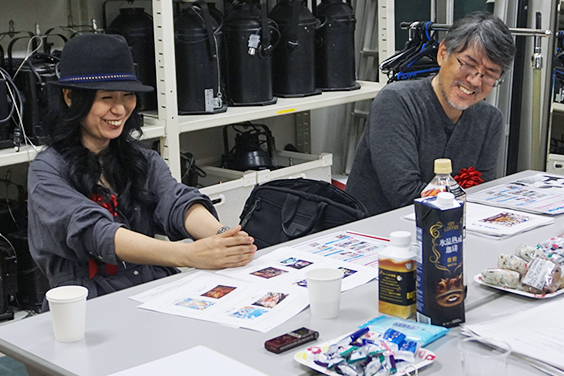
(From left) Reine Hibiki and Haruhiko Mikimoto
ab: The "MCPO AWARD 2017" had many entries from abroad. Could you tell us about how your manga has been received and the feedback you've been given from fans overseas?
Hibiki: I'm so jealous!

ab: The "MCPO AWARD 2017" had many entries from abroad. Could you tell us about how your manga has been received and the feedback you've been given from fans overseas?
Ueyama: My anime "Cooking Papa" has been shown in quite a few places. People from Malaysia and Macao have told me that they grew up watching "Cooking Papa." And when I heard that I thought "wow, really?!" It made me realize that the power of anime is amazing! In terms of my manga, (outside of Japan) it's only been released in Taiwan and Korea. But I think it is still known because of the anime. In this contest, I learnt a lot by seeing works from abroad.
Minazuki: My personal email address can be found on the internet. They must have got it from there, because I suddenly got a message from Finland or Canada saying "congratulations on the 10 year anniversary of 'Sora no Otoshimono (Heaven's Lost Property)!'" It was amazing as I had completely forgotten (that it was the anniversary)! The response has been amazing. The passion amongst readers feels like how it was back in the 80's. If the readers are that passionate, then aspiring manga artists should also have a strong sense of passion. I think the notion that "manga is Japan" might change one day.
Minazuki: My personal email address can be found on the internet. They must have got it from there, because I suddenly got a message from Finland or Canada saying "congratulations on the 10 year anniversary of 'Sora no Otoshimono (Heaven's Lost Property)!'" It was amazing as I had completely forgotten (that it was the anniversary)! The response has been amazing. The passion amongst readers feels like how it was back in the 80's. If the readers are that passionate, then aspiring manga artists should also have a strong sense of passion. I think the notion that "manga is Japan" might change one day.
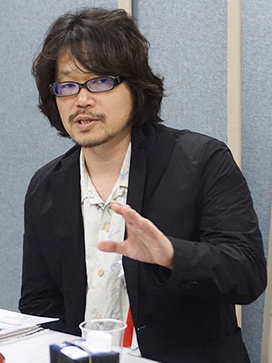
Seguchi: I don't have many opportunities to interact with people overseas, but I find a lot of Korean artists featured in one magazine. Their Japanese is so good and they have really detailed knowledge of the culture. When I ask them how they learnt Japanese, they always say from manga. Who knew that manga could teach us so much! And it's not just one, or two people… It's pretty common, which is quite surprising!
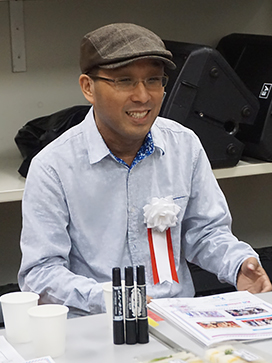
Minazuki: In university, I had a French classmate studying abroad here in Japan. I asked "why do you want to learn Japanese?" It was because my classmate wanted to read "Hokuto no Ken (Fist of the North Star)" in the original language and become a manga translator in the future.
Everyone: Wow!
Hibiki: There definitely is people with experiences like that!
Seguchi:
A while ago I was in Italy, and as it's a country I associate with fashionable guys, I decided to go to a smart tailors to get a suit made. The staff asked me what I did and when I said that I was a manga artist, I was asked to draw "Tsurikichi Sanpei." I did a rough sketch as a kind of memento, which didn't really resemble "Tsurikichi Sanpei" at all. But they were so happy and were like "Woo, Sanpei!" (lol)!
Everyone: Wow!
Hibiki: There definitely is people with experiences like that!
Seguchi:
A while ago I was in Italy, and as it's a country I associate with fashionable guys, I decided to go to a smart tailors to get a suit made. The staff asked me what I did and when I said that I was a manga artist, I was asked to draw "Tsurikichi Sanpei." I did a rough sketch as a kind of memento, which didn't really resemble "Tsurikichi Sanpei" at all. But they were so happy and were like "Woo, Sanpei!" (lol)!
Everyone: (lol)
Mikimoto:I think that the influence of Japanese manga and anime has been amazing. For example, when you think of Japanese publishers cooperating with Chinese companies, to put together magazines and the the artists over there… They've done so much research into Japan that their work is pretty much indistinguishable from something that a Japanese artist would create. And that applies to quite a lot of people!
The impact has been awesome, but at the same time, places that are influenced by Japanese manga also have their own great qualities and distinctive traits. It would be nice if those characteristics from places like China and Europe also had an effect on what Japanese artists produce sometime soon.
Mikimoto:I think that the influence of Japanese manga and anime has been amazing. For example, when you think of Japanese publishers cooperating with Chinese companies, to put together magazines and the the artists over there… They've done so much research into Japan that their work is pretty much indistinguishable from something that a Japanese artist would create. And that applies to quite a lot of people!
The impact has been awesome, but at the same time, places that are influenced by Japanese manga also have their own great qualities and distinctive traits. It would be nice if those characteristics from places like China and Europe also had an effect on what Japanese artists produce sometime soon.
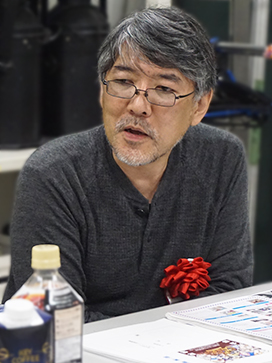
Even with the illustrations and pictures at today's public screening, I think there were some typically Japanese style works, which are professional by Japanese standards, I even thought some of them could get a job here straight away. But at the same time, there were some unique distinctive works that not so many Japanese artists could draw. So, I think it would be good if artists from Japan and overseas could inspire and influence each other.
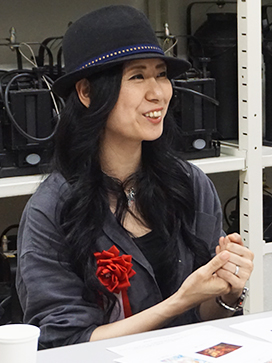
Hibiki: We were speaking a little bit about this before, but overseas fans of Japanese manga and anime are more forthcoming and excited, which gives us artists a nice boost. In Japan, the readers are a bit more shy and reluctant to tell an artist that they like their work. But abroad it seems like fans are much more willing to express their interest and that really means a lot. It's great to get such a warm response from people outside of Japan. I think having that kind of contact with fans from overseas can help motivate Japanese artists. I think opportunities like that are awesome, it's so great meeting manga fans from abroad. It makes me really happy, I love it!
Ueyama: There are parks in Hong Kong that feature objects and installations inspired by manga characters, right? There's also a lot of interest and passion from fans in Taiwan.
Hibiki: I guess people in Japan tend to think of manga as something special. But like you said, overseas it is more a part of their every day life. Anime and manga are actually starting to appear in real life cities! I think that's so amazing!
Ueyama: There are parks in Hong Kong that feature objects and installations inspired by manga characters, right? There's also a lot of interest and passion from fans in Taiwan.
Hibiki: I guess people in Japan tend to think of manga as something special. But like you said, overseas it is more a part of their every day life. Anime and manga are actually starting to appear in real life cities! I think that's so amazing!
 Measures and provisions are being taken at various locations in an effort to prevent the spread of the new coronavirus.
Measures and provisions are being taken at various locations in an effort to prevent the spread of the new coronavirus.




